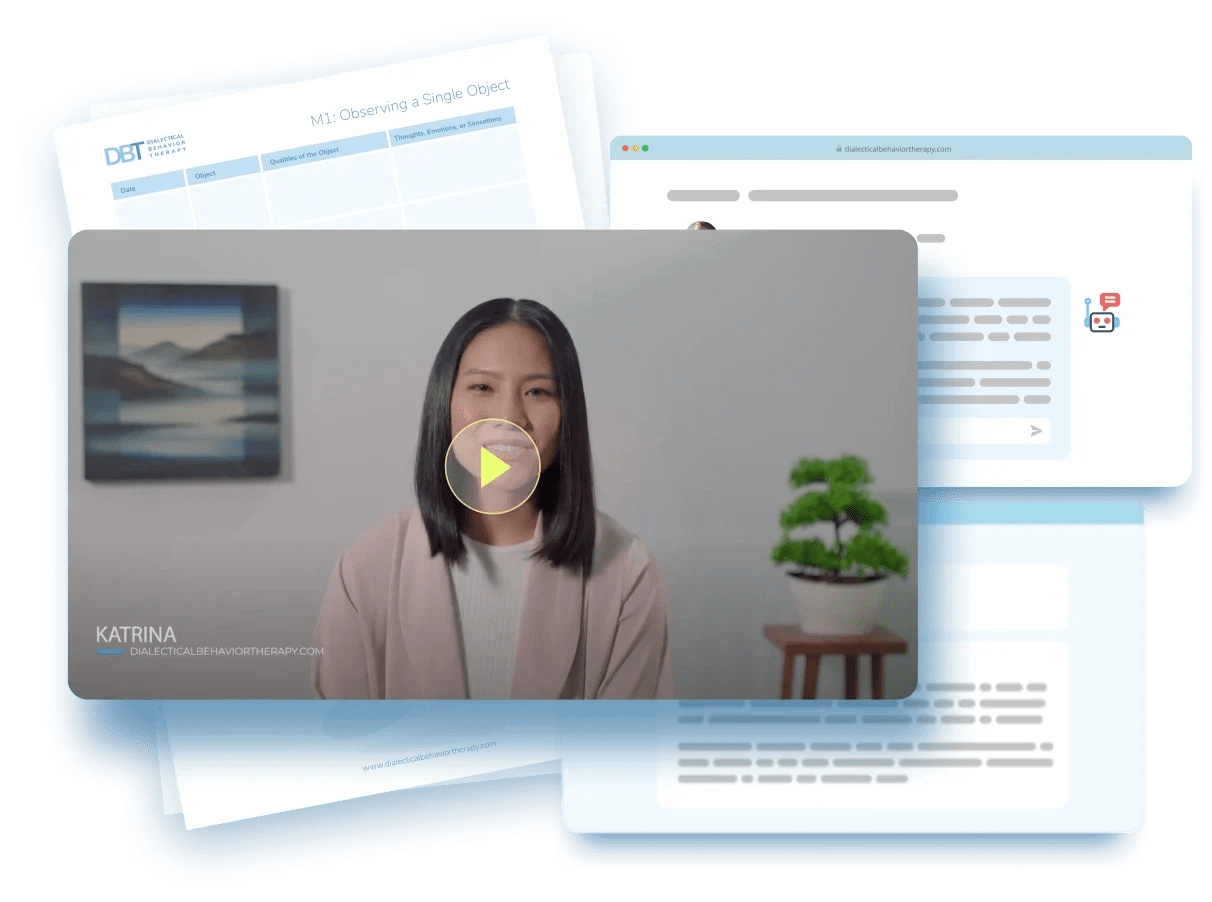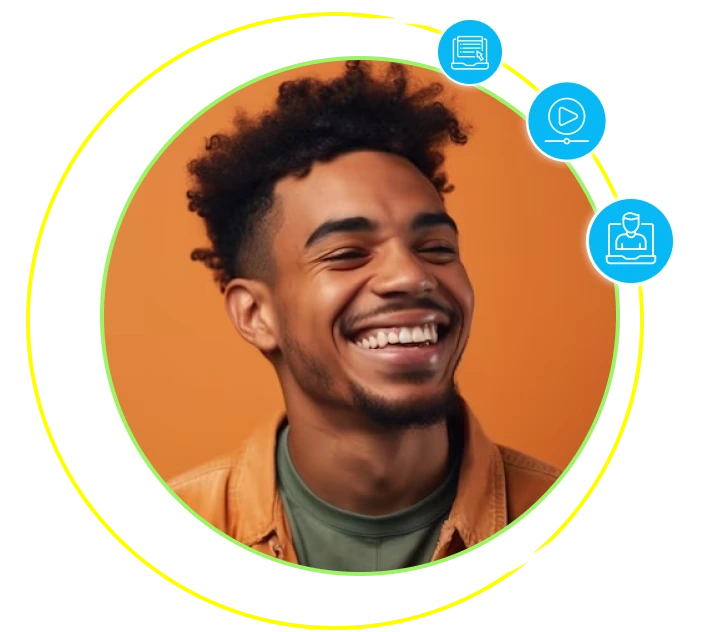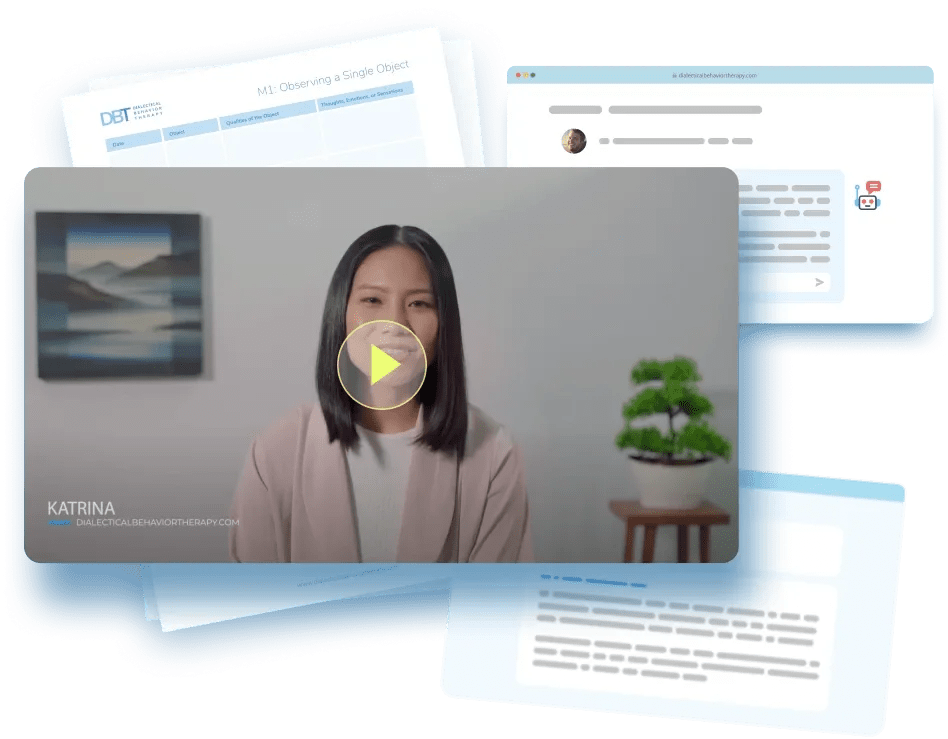What is Interpersonal Effectiveness?
Imagine you’re at work and a colleague has unintentionally taken credit for your idea in a team meeting. Instead of reacting impulsively or harboring resentment, you decide to use interpersonal effectiveness skills.
You request a private conversation with your colleague, where you calmly and assertively express how you feel about the situation. You listen to their perspective, empathize with their oversight, and collaboratively find a solution to ensure proper recognition and prevent future misunderstandings.
This approach not only resolves the immediate issue but also strengthens your professional relationship and mutual respect.
Interpersonal Effectiveness refers to the skills and strategies you use to interact effectively with others. These skills can help you build and maintain positive relationships, communicate needs and desires effectively, and manage conflicts in a constructive way.
The key aspects of Interpersonal Effectiveness include:
- Communication Skills: The ability to clearly and assertively communicate your thoughts, feelings, and needs.
- Emotional Intelligence: Understanding and managing your own emotions, as well as other people’s.
- Conflict Resolution: Skills for resolving disagreements.
- Assertiveness: Expressing yourself in a confident and self-assured way without being aggressive.
- Empathy and Understanding: The ability to put yourself in another’s shoes.
- Boundary Setting: Knowing and communicating your personal limits and expectations in relationships.
- Relationship Building: Skills in forming and maintaining healthy, supportive relationships.
- Problem-Solving: Effectively addressing and resolving issues that arise in your relationships.
Interpersonal Effectiveness as a Module in DBT
Interpersonal Effectiveness in Dialectical Behavior Therapy (DBT) equips you with a set of skills designed to help you interact with others in a way that is assertive, maintains self-respect, and strengthens relationships.
In DBT, this module is usually taught last, as the first three (Mindfulness, Distress Tolerance, Emotional Regulation) lay down the foundation for Interpersonal Effectiveness skills.
What are the Interpersonal Effectiveness Skills in DBT?
This page helps you practice and master 10 Interpersonal Effectiveness skills:
- exercise I1: Communication Styles Focus on identifying personal communication styles for mindful interaction.
- exercise I2 & I3: Skills of Assertiveness Teach how to express opinions, emotions, and needs clearly, honestly, and respectfully.
- exercise I4: Assertiveness Scripts and Interpersonal Rights Provide templates for clear communication.
- exercise I5: Listening and Validation Emphasize attentive and mindful listening skills.
- exercise I6: Barriers to Interpersonal Effectiveness Address common obstacles in effective communication.
- exercise I7: Trust in Relationships Explore building trust and honesty in relationships.
- exercise I8: Interpersonal Boundaries Discuss awareness of boundaries for productive outcomes.
- exercise I9: Modulating Intensity Navigate making requests assertively.
- exercise I10: Resistance and Conflict Master effective communication in challenging situations.
How Do Interpersonal Effectiveness Worksheets Work With the Exercises?
We offer 10 free videos and worksheets you can take advantage of in this module. Our worksheets work with you in different ways:
- Provide you structure: These provide order and let you gradually learn the skills needed to improve your Interpersonal Effectiveness.
- Remind you of the skills you learned so far: You can go back to your worksheets to review and even print the worksheets again to retry the exercise.
- Give you reflection questions: Worksheets also can give you questions to help you reflect on their interpersonal interactions and identify areas for improvement.
- Ensure consistent improvement: You get to practice and reinforce your newfound skills in safe, controlled environments.
Benefits of Interpersonal Effectiveness Skills
Aside from the obvious benefit of improving your communication skills, reducing conflicts in personal and work life, and being able to immediately solve problems, there are a lot of additional long-term benefits.
In the long term, healthy interpersonal skills lead to stronger, more fulfilling relationships, enhanced self-confidence, better emotional regulation, and overall improved mental well-being. These skills foster a healthier social environment and personal growth over time.

Consequences of Poor Interpersonal Skills
Like good interpersonal skills, poor interpersonal skills can lead to immediate and long-term consequences.
In the short term, they often result in misunderstandings, conflicts, and stress in your relationships. If these happen repeatedly, this can lead to long-term problems like chronic relationship problems, social isolation, and depression. These can negatively affect both professional and personal life.
How to Build Interpersonal Effectiveness
Interpersonal Effectiveness is like muscle – you can exercise and build it. What was hard before becomes easier as long as you keep up with your workouts.
The exercises we have here on this site are a good place to start – we have ten exercises, all have a video and a worksheet you can take advantage of for free.
Subscribe.
Get the DBT course. Free!
Get your full access to our 26-week DBT course.
Lessons emailed to you twice a week.

Frequently Asked Questions
- DBT is best done in groups, so the Interpersonal Effectiveness exercises on this site are a great option.
- Role-playing can also be a good way to practice. Simulating real-life situations may feel weird at first, but keep at it. Practice makes perfect.
- Facilitated conversations around specific interpersonal scenarios or challenges you encounter often are also a great option.
- Hold activities focusing on enhancing listening skills, such as mirroring or summarizing what others have said.
- Hold empathy-building exercises that let people relate to other people’s situations. Good examples of empathy-building activities include Shoe Swap, Complete Me, or Appreciation Rounds.
Here are some ideas. Practice interpersonal effectiveness daily and you will gradually get better!
- Active Listening: Practice active listening by giving full attention, minimizing distractions, and responding appropriately during your conversations with other people.
- Sense of Humor: Sharing humor can improve relationships. It’s not about being naturally witty, but about learning to see and share the lighter side of situations.
- Show Appreciation: Regularly express gratitude and appreciation to your colleagues and peers. This strengthens your relationships and builds a positive environment.
- Friendly But Direct Communication: Communicate your needs and boundaries clearly. While it’s important to be direct, also maintain a friendly and respectful demeanor.
- Learn from Others: Observe your colleagues who are skilled at interpersonal interactions. Learn from their approach to communication, problem-solving, and how they lift the spirits of those around them.
- Reflect on Interactions: Regularly think about your recent interactions. Identify the objectives you met and areas where you faced discomfort or struggled.
Interpersonal Effectiveness skills, as taught in DBT, can be highly beneficial in your romantic relationships. These skills help you communicate more effectively, understand and empathize with your partner’s perspective, and manage conflicts in a healthier way.
Interpersonal Effectiveness works wonders at the workplace. Here are some of the benefits:
- Building Stronger Relationships: You can communicate better with your colleagues.
- Conflict Management: You can de-escalate conflicts quickly using the Interpersonal Skills taught in DBT.
- Enhancing Empathy: Empathy allows you to understand and share the feelings of others. This fosters a more compassionate and supportive team.
- Boosting Motivation and Engagement: A positive work environment, facilitated by strong interpersonal skills, can increase your team’s satisfaction and productivity.
One of the challenges of learning DBT Interpersonal skills is that many people assume they already have good communication skills – when in reality, they may lack the fundamentals. Unless they accept that, they will have a hard time learning new skills.
Another challenge lies in the complexity of these skills. An example would be the difficulty of maintaining active listening and other targeted behaviors during interactions. This makes learning Interpersonal Effectiveness skills harder to learn. This is one of the reasons it is usually the last module to be taught in DBT.
Developing interpersonal skills involves more than just being pleasant; it requires learning specific behaviors and competencies for effective collaboration and communication. With the multitude of skills taught in Interpersonal Effectiveness, it’s often challenging to identify and focus on the skills most relevant to one’s role and career objectives.
References
- NIH National Library of Medicine. “The efficacy of applying the Interpersonal Effectiveness skills of dialectical behavior therapy into communication skills workshop for clinical nurses”.
- Harvard Business Review. “Practice Empathy as a Team”.
- Atlassian. “Beyond the buzzwords: Why interpersonal skills matter at work”.
- Dixon-Gordon, K. L., Chapman, A. L., & Turner, B. J. (2015). A preliminary pilot study comparing dialectical behavior therapy emotion regulation skills with interpersonal effectiveness skills and a control group treatment. Journal of Experimental Psychopathology, 6(4), 369-388.
- Lenz, A. S., Del Conte, G., Hollenbaugh, K. M., & Callendar, K. (2016). Emotional regulation and interpersonal effectiveness as mechanisms of change for treatment outcomes within a DBT program for adolescents. Counselling Outcome Research and Evaluation, 7(2), 73-85.




I was wondering if you have any worksheets or tools for teenagers. My son is ADHD ODD ruling out Bi Polar & PTSD I need some real help.
ADMIN – Hi Gena,
Teenagers are old enough to use the adult DBT worksheets that are on the site. Sounds like you might need more help than the self-help resources on the site. Are there any local resources available through your son’s school or your local healthcare system?
Do you recommend a parturition order of doing these modules, and how many per day so you recommend? Is it better to work all the way through one module or is it helpful to do one or some exercise from each module daily?
These are so helpful!
ADMIN – Hi Viv,
I focus on just one exercise per day, and I keep working on it until I feel comfortable with it. Some exercises are going to be really useful to you, and you should keep revisiting them as needed. Other exercises won’t be useful to you and after giving them a try you should move on. You are going to master some of the skills after just a few sessions, some of those skills will be long-term things you keep revisiting.
One thing worth noting, focus more on whether you think the skill is useful, and less on whether it is difficult or something you like doing. Sometimes initial discomfort leads to a lot of progress.
Hi Viv,
I focus on just one exercise per day, and I keep working on it until I feel comfortable with it. Some exercises are going to be really useful to you, and you should keep revisiting them as needed. Other exercises won’t be useful to you and after giving them a try you should move on. You are going to master some of the skills after just a few sessions, some of those skills will be long-term things you keep revisiting.
One thing worth noting, focus more on whether you think the skill is useful, and less on whether it is difficult or something you like doing. Sometimes initial discomfort leads to a lot of progress.
Good website I am starting the exercises today!
I am looking for the most official website for learning about DBT as a professional who wants to be trained in DBT. There are clearly many outlets to be trained as a DBT practitioner, but I would like to pursue this through the most official means possible to ensure the best training.
great work keep it up!
very useful course
Just started course today and I’ve got to say I was a little bit sceptical as I’ve been under the mental health system for over 30 years on various medications and have tried so many different treatments but none have ever really truly helped me to a place where I actually enjoy life and can handle people and relationships I’m not holding my breathe as I thought emdr was going to be the saviour but after just the first exercise I feel like there might just be a light at the end of this very dark tunnel the at has been my life
ADMIN – Hey Jason,
That’s a hard road you’ve been down.
Some advice a coach gave me was that sometimes there isn’t a single thing that helps much. But, it’s a combintion of say 10 things that each make it 3-5% better. None of them alone do much. But combined, you get 40% relief.